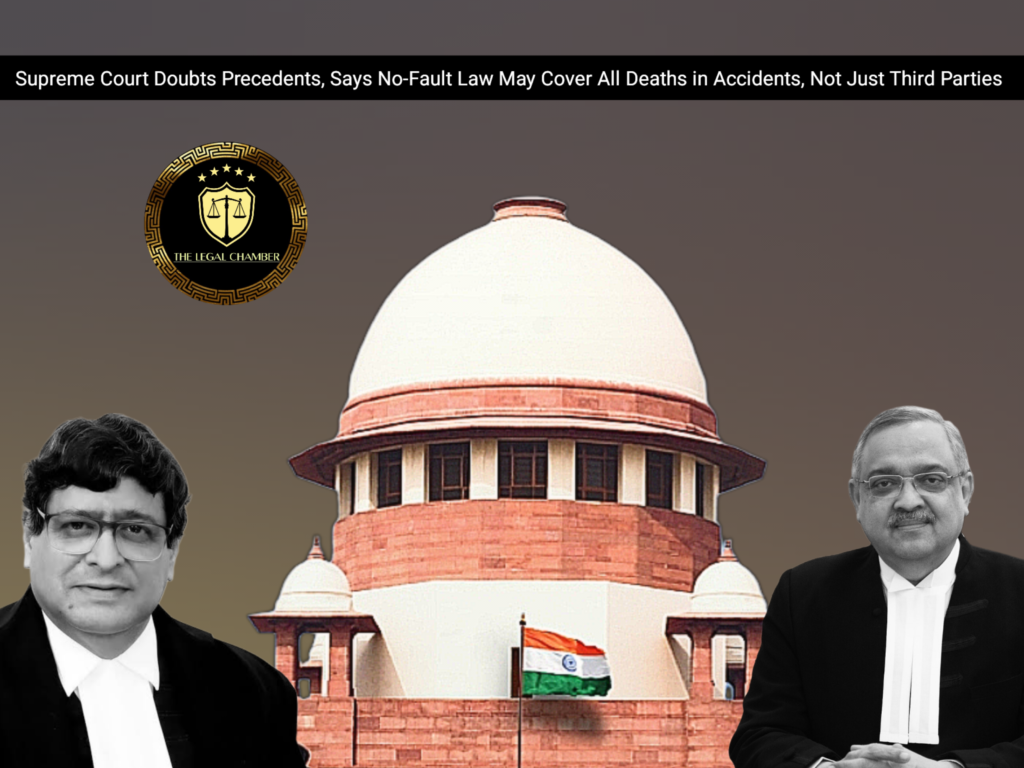
This Supreme Court order holds that Section 163A of the Motor Vehicles Act, 1988, is a non-obstante provision that overrides the Act and insurance policy terms. It questions prior rulings that restrict its application to third parties, proposing that it may also cover claims by the legal heirs of an owner-driver, necessitating a reference to a larger Bench for an authoritative pronouncement.
Facts Of The Case:
A minor petitioner, represented by her aunt, filed a claim under Section 163A of the Motor Vehicles Act, 1988, before the Motor Accident Claims Tribunal, Cuttack, seeking compensation for the death of both her parents in a motor vehicle accident. The accident occurred when the vehicle, owned and driven by the petitioner’s father, suffered a tyre burst, dashed against a roadside building, and resulted in the deaths of all four occupants. The MACT awarded compensation for both deaths. However, the High Court dismissed the petitions as not maintainable because the deceased owner was wrongly impleaded as a respondent. The Supreme Court found this reasoning untenable under Section 155 of the Act, which allows a claim to survive against the insurer after the insured’s death. The core legal dispute revolved around whether a claim under Section 163A, which requires no proof of negligence, is maintainable against an insurer for the death of the owner-driver, or if such claims are restricted only to third parties as per the insurance policy and prior judicial precedents.
Procedural History:
The claim was initially filed by the petitioner, a minor represented by her aunt, before the Motor Accident Claims Tribunal (MACT) in Cuttack under Section 163A of the Motor Vehicles Act, 1988. The MACT allowed the claim and awarded compensation for the deaths of both parents. The respondent Insurance Company appealed to the High Court, which set aside the MACT’s award, holding the entire petition was not maintainable because a deceased person (the owner) had been impleaded as a party. The petitioner then filed a Special Leave Petition before the Supreme Court, which admitted the appeal and, after hearing arguments, concluded the High Court’s reasoning was flawed. However, finding a conflict in jurisprudence on the application of Section 163A to an owner-driver, the Supreme Court directed the matter be placed before the Chief Justice of India for constitution of a larger bench to provide an authoritative pronouncement.
READ ALSO :Landmark Ruling: Supreme Court Shields Property Owners from Criminal Case Over Failed Sale Agreement
Court Observation:
The Court observed that the High Court’s finding of non-maintainability for impleading a deceased owner was erroneous, citing Section 155 of the MV Act which allows a claim to survive against the insurer. It noted the non-obstante clause in Section 163A overrides the entire Act, other laws, and any instrument having force of law, including insurance policy terms. The Bench expressed its inability to agree with prior judgments that restricted Section 163A claims only to third parties, reasoning that the provision’s language makes the owner and insurer liable for compensation as per the structured formula without proof of negligence for any death, including that of an owner-driver. It respectfully doubted the correctness of co-ordinate Bench decisions on this issue and opined that an authoritative pronouncement from a larger Bench was necessary to resolve the conflict.
Final Decision & Judgement:
The Supreme Court allowed the appeal in part. It restored the Tribunal’s award granting compensation for the death of the petitioner’s mother, as she was a clear third party. However, regarding the claim for the death of the owner-driver father, the Court did not issue a final ruling. Instead, it expressed doubt over previous judgments that barred such claims under Section 163A of the Motor Vehicles Act. Holding that this substantial legal question required an authoritative pronouncement, the Court directed the Registry to place the matter before the Chief Justice of India for the constitution of a larger Bench to conclusively decide whether the beneficial, no-fault liability under Section 163A extends to the legal heirs of a deceased owner-driver.
Case Details:
Case Title: Wakia Afrin (Minor) vs. M/S National Insurance Co. Ltd. Civil Appeal No.: Special Leave Petition (Civil) Nos. 15447-48 of 2024 Date of Judgement: August 01, 2025 Judges/Justice Name: Justice Sudhanshu Dhulia and Justice K. Vinod Chandran
Download The Judgement Here